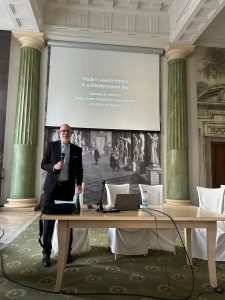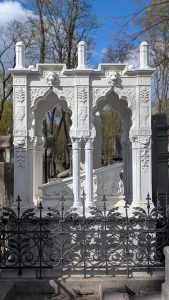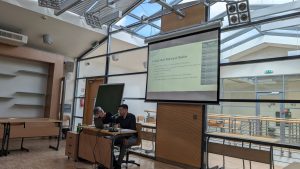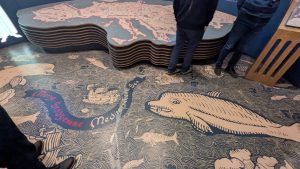by Dr. Sasha Goldstein-Sabbah (University of Groningen)
From April 6-8 2025, the historic halls of the University of Warsaw became the vibrant meeting ground for sixteen scholars from across Europe converging to rethink and reframe Jewish histories through a Mediterranean lens. The workshop, titled Jewish Dis/Connections across and beyond the Modern Mediterranean, offered more than a gathering of minds—it was an invitation to rethink boundaries, identities, and narratives that have long defined Jewish studies in Europe.
Why the Mediterranean, Why Now?
Traditionally, European Jewish history has centered on communities in Central, Western, and Eastern Europe. Southern Europe and the Mediterranean have often been either marginalized or treated as outliers in scholarly discourse. This workshop sought to flip that script.
Guided by the organizing team—Dr. Magdalena Kozłowska (University of Warsaw), Dr. Noëmie Duhaut (University of Southampton), and Dr. Sasha Goldstein-Sabbah (University of Groningen)—the event proposed an integrative approach to Jewish history. It focused on mobility, not just of people, but of ideas, objects, languages, and institutions. As modern historians turn increasingly toward transnational and transimperial perspectives, this gathering highlighted how Jewish lives in and around the Mediterranean challenge established categories and regional divides.
A Crossroads of Scholarship
Over three days, participants dove into a panoply of themes: from nationalism and empire to gender, race, and commemoration. The unifying thread? The complex, often contradictory nature of Jewish mobility and identity in Mediterranean contexts.
In a thought provoking keynote, Prof. Matthias B. Lehmann (University of Cologne) explored what a Mediterranean framework might bring to modern Jewish history. Building on S.D. Goitein’s famed application of this approach to the medieval Geniza world, Lehmann encouraged scholars to view the Mediterranean not simply as a connector but also as a site of rupture and redefinition.

Matthias B. Lehmann giving the Keynote address in Warsaw April 2025, photograph by Noëmie Duhaut all rights reserved (2025)
What emerged was a rich portrait of the Mediterranean as a space where Jewish identity has been shaped and reshaped—through colonial entanglements, economic migrations, cultural affiliations, and diasporic memory.
From Algeria to the Negev: Snapshots of a Disconnected Yet Intertwined World
The range of presentations spoke to the diverse and dynamic range of research being conducted in Europe.
Eliaou Balouka’s work on Jewish-Muslim symbioses in Algeria unearthed little-known stories of shared mourning rituals and theological overlap—histories often eclipsed by modern polarizations. Dr. Roy Shukrun flipped the lens to post-independence Israel, where Moroccan Jewish migrants negotiated their North African pasts within the state-building landscape of the Negev.
Other presenters followed the threads of mobility through less obvious routes. Lida Dodou reimagined the Jewish migration from Salonika, traditionally viewed through its maritime port, by tracing rail connections to Hapsburg Europe. Dr. Dario Miccoli followed the Jews of Rhodes across the globe, showing how these movements were driven by both opportunity and trauma—from Fascist persecution to the Holocaust and decolonization.
Meanwhile, Dr. Noëmie Duhaut and Dr. Paris Papamichos-Chronakis spotlighted Jewish involvement in diplomacy and humanitarianism. Their work revealed Jews as not just passive recipients of aid or displaced peoples, but also as active players in shaping transnational relief efforts and legal networks.
These papers were not isolated inquiries—they spoke to each other, building a conversation that crisscrossed disciplines and geographies. From Calcutta to Beirut, from Libya to British India, participants traced how Jewish lives were constantly entangled in the shifting tides of empire, modernity, and memory.
Bridging Generations and Institutions
One of the workshop’s most central objectives was its commitment to inclusivity. PhD candidates and early career scholars shared the floor with established academics, generating a dynamic and collaborative atmosphere. For many, it was a rare chance to present in-progress work to a responsive, interdisciplinary audience.
By bringing this conversation into the heart of Europe, the organizers also made a statement: the study of Mediterranean Jewish history belongs within European academic institutions, not at their periphery. Warsaw—symbolically and geographically far from the Mediterranean—became an unlikely but fitting host, underscoring the workshop’s central message about interconnectedness and scholarly realignment.
Looking Ahead
The workshop was not just a one-off event. Plans are already in motion for a special issue in a peer-reviewed journal featuring selected papers, and future conference panels are in the works. Collaborations have been sparked with networks like “The Modern Mediterranean” and “EUME,” and a follow-up workshop is being discussed with Prof. Lehmann.
The workshop included two cultural excursions, to allow workshop attendees to appreciate the depth of Jewish history present in Warsaw. Participants toured the POLIN Museum and the Okopowa Street Jewish Cemetery, one thing was clear: this wasn’t just about history—it was about rewriting its map.

Grave monument in the Okopowa Street Jewish Cemetery, photograph by Noëmie Duhaut all rights reserved (2025)
A New Chapter in Jewish Studies
Jewish Dis/Connections across and beyond the Modern Mediterranean signaled a growing momentum within the field to challenge Eurocentric narratives and embrace more pluralistic, mobile histories. It invited scholars to consider the Mediterranean not just as a space of nostalgia or origin, but as a living framework—one that reframes Jewish experience through routes taken, borders crossed, and identities forged in motion.
As conversations sparked in Warsaw continue to ripple outward, this workshop has laid the groundwork for a reinvigorated, transregional approach to Jewish history—one that is as complex, dynamic, and interconnected as the Mediterranean world itself.


